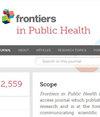用于检测和监测非洲重点易流行疾病的诊断方法:对检测能力和加强实验室需求的评估
IF 3
3区 医学
Q2 PUBLIC, ENVIRONMENTAL & OCCUPATIONAL HEALTH
引用次数: 0
摘要
2023 年,非洲将发生 180 起突发公共卫生事件,其中 90% 为传染病,75% 与人畜共患病有关。流行病检测能力对于快速准确地识别致病因子和采取行动防止疾病传播至关重要。此外,检测对于监测疾病传播、评估公共卫生干预措施以及在疾病爆发时为有针对性的资源分配提供信息也至关重要。在非洲联盟成员国开展了一项在线自我评估调查,以确定易流行疾病检测方面的主要挑战。调查评估了不同实验室诊断重点易流行疾病的现有能力。调查探讨了在建立和维持检测能力以改善疫情应对和减轻公共卫生影响方面所面临的挑战。调查数据按国家分析了重点传染病的诊断能力、使用中的诊断技术、现有监测计划和限制诊断能力的挑战。来自 15 个会员国的调查结果显示,各国的检测能力和技术存在很大差异,限制登革热和克里米亚-刚果出血热等某些重点疾病检测能力的因素多种多样。同时,由于以前的投资,2019 年冠状病毒病(COVID-19)、脊髓灰质炎和麻疹的诊断能力较强。遗憾的是,尽管多重检测具有改善诊断途径的潜力,但许多国家并没有加以利用。由于实验室能力有限,未来疫情检测面临的挑战确实很大。最近在非洲爆发的疾病突出表明,迫切需要加强诊断能力和引进具有成本效益的技术。样本量小以及各国对疾病优先级的不同限制了分析结果。这些研究结果表明,对易流行疾病的实验室检测能力进行评估是有益的,并强调了有效应对检测疾病和预防未来流行病挑战的重要性。本文章由计算机程序翻译,如有差异,请以英文原文为准。
Diagnostics for detection and surveillance of priority epidemic-prone diseases in Africa: an assessment of testing capacity and laboratory strengthening needs
In 2023, Africa experienced 180 public health emergencies, of which 90% were infectious diseases and 75% were related to zoonotic diseases. Testing capacity for epidemic-prone diseases is essential to enable rapid and accurate identification of causative agents, and for action to prevent disease spread. Moreover, testing is pivotal in monitoring disease transmission, evaluating public health interventions and informing targeted resource allocation during outbreaks. An online, self-assessment survey was conducted in African Union Member States to identify major challenges in testing for epidemic-prone diseases. The survey assessed current capacity for diagnosing priority epidemic-prone diseases at different laboratory levels. It explored challenges in establishing and maintaining testing capacity to improve outbreak response and mitigate public health impact. Survey data analysed diagnostic capacity for priority infectious diseases, diagnostic technologies in use, existing surveillance programmes and challenges limiting diagnostic capacity, by country. The survey result from 15 Member States who responded to the survey, showed high variability in testing capacity and technologies across countries and diverse factors limiting testing capacity for certain priority diseases like dengue and Crimean-Congo haemorrhagic fever. At the same time diagnostic capacity is better for coronavirus disease 2019 (COVID-19), polio, and measles due to previous investments. Unfortunately, many countries are not utilizing multiplex testing, despite its potential to improve diagnostic access. The challenges of limited laboratory capacity for testing future outbreaks are indeed significant. Recent disease outbreaks in Africa have underscored the urgent need to strengthen diagnostic capacity and introduce cost-effective technologies. Small sample sizes and differing disease prioritisation within each country limited the analysis. These findings suggest the benefits of evaluating laboratory testing capacity for epidemic-prone diseases and highlight the importance of effectively addressing challenges to detect diseases and prevent future pandemics.
求助全文
通过发布文献求助,成功后即可免费获取论文全文。
去求助
来源期刊

Frontiers in Public Health
Medicine-Public Health, Environmental and Occupational Health
CiteScore
4.80
自引率
7.70%
发文量
4469
审稿时长
14 weeks
期刊介绍:
Frontiers in Public Health is a multidisciplinary open-access journal which publishes rigorously peer-reviewed research and is at the forefront of disseminating and communicating scientific knowledge and impactful discoveries to researchers, academics, clinicians, policy makers and the public worldwide. The journal aims at overcoming current fragmentation in research and publication, promoting consistency in pursuing relevant scientific themes, and supporting finding dissemination and translation into practice.
Frontiers in Public Health is organized into Specialty Sections that cover different areas of research in the field. Please refer to the author guidelines for details on article types and the submission process.
 求助内容:
求助内容: 应助结果提醒方式:
应助结果提醒方式:


